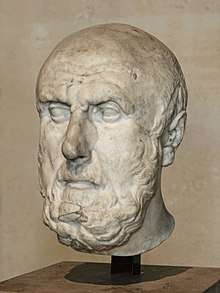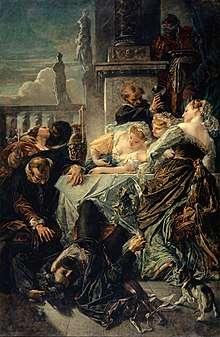Death from laughter
Death from laughter is a rare form of death, usually resulting from cardiac arrest or asphyxiation, caused by a fit of laughter. Instances of death by laughter have been recorded from the times of ancient Greece to the modern day.


Pathophysiology
Death may result from several pathologies that deviate from benign laughter. Infarction of the pons and medulla oblongata in the brain may cause pathological laughter.[2]
Laughter can cause atonia and collapse ("gelastic syncope"),[3][4][5][6] which in turn can cause trauma. See also laughter-induced syncope, cataplexy, and Bezold-Jarisch reflex. Gelastic seizures can be due to focal lesions to the hypothalamus.[7] Depending upon the size of the lesion, the emotional lability may be a sign of an acute condition, and not itself the cause of the fatality. Gelastic syncope has also been associated with the cerebellum.[8]
Notable cases
- Zeuxis, a 5th-century BC Greek painter, is said to have died laughing at the humorous way in which he painted the goddess Aphrodite – after the old woman who commissioned it insisted on modeling for the portrait.[9]
- One ancient account of the death of Chrysippus, the 3rd-century BC Greek Stoic philosopher, tells that he died of laughter after he saw a donkey eating his figs; he told a slave to give the donkey neat wine with which to wash them down, and then, "having laughed too much, he died" (Diogenes Laërtius 7.185).[10]
- In 1410, King Martin of Aragon died from a combination of indigestion and uncontrollable laughter triggered by a joke told by his favourite court jester.[11]
- In 1556, Pietro Aretino "is said to have died of suffocation from laughing too much".[12]
- In 1660, Thomas Urquhart, the Scottish aristocrat, polymath, and first translator of François Rabelais's writings into English, is said to have died laughing upon hearing that Charles II had taken the throne.[13][14]
- In 1799, William Cushing, a pauper who lived in the parish of St Andrew's, Norwich, England, died from "a fit of excessive laughter, which lasted five minutes."[15]
- On October 14, 1920, 56-year-old Mr. Arthur Cobcroft, a dog trainer from Loftus Street, Leichhardt, Australia, was reading a five year old newspaper and was amused at the prices for some commodities in 1915 as compared to 1920. He made a remark to his wife regarding this, and burst into laughter, and in the midst of it he collapsed and died. A doctor named Nixon was called in, and stated that the death was due to heart failure, brought by excessive laughter.[16][17][18][19]
- On 24 March 1975, Alex Mitchell, from King's Lynn, England, died laughing while watching the "Kung Fu Kapers" episode of The Goodies, featuring a kilt-clad Scotsman with his bagpipes battling a master of the Lancastrian martial art "Eckythump", who was armed with a black pudding. After 25 minutes of continuous laughter, Mitchell finally slumped on the sofa and died from heart failure. His widow later sent The Goodies a letter thanking them for making Mitchell's final moments of life so pleasant.[20][21][22][23][24] Diagnosis of his granddaughter in 2012 of having the inheritable long QT syndrome (a heart rhythm abnormality) suggests that Mitchell may have died of a cardiac arrest caused by the same condition.[25]
See also
- Kuru, also known as "laughing sickness"
- Laughing gas
- Paradoxical laughter
- Sardonicism
- Tickle torture
References
- Inwood, B. and Gerson, L.P. (2008) The Stoics Reader: Selected Writings and Testimonia. Indianapolis, IN: Hackett Publishing, p. 6
- Gondim FA, Parks BJ, Cruz-Flores S (December 2001). "'Fou rire prodromique' as the presentation of pontine ischaemia secondary to vertebrobasilar stenosis". J Neurol Neurosurg Psychiatry. 71 (6): 802–804. doi:10.1136/jnnp.71.6.802. PMC 1737630. PMID 11723208.
- Reiss AL, Hoeft F, Tenforde AS, Chen W, Mobbs D, Mignot EJ (2008). Greene E (ed.). "Anomalous hypothalamic responses to humor in cataplexy". PLoS ONE. 3 (5): e2225. doi:10.1371/journal.pone.0002225. PMC 2377337. PMID 18493621.
- Nishida K, Hirota SK, Tokeshi J (2008). "Laugh syncope as a rare sub-type of the situational syncopes: a case report". J Med Case Rep. 2 (1): 197. doi:10.1186/1752-1947-2-197. PMC 2440757. PMID 18538031.
- Totah AR, Benbadis SR (January 2002). "Gelastic syncope mistaken for cataplexy". Sleep Med. 3 (1): 77–8. doi:10.1016/S1389-9457(01)00113-7. PMID 14592259.
- Lo R, Cohen TJ (November 2007). "Laughter-induced syncope: no laughing matter". Am. J. Med. 120 (11): e5. doi:10.1016/j.amjmed.2006.07.019. PMID 17976409.
- Cheung CS, Parrent AG, Burneo JG (December 2007). "Gelastic seizures: not always hypothalamic hamartoma". Epileptic Disord. 9 (4): 453–8. doi:10.1684/epd.2007.0139 (inactive 2020-01-22). PMID 18077234.
- Famularo G, Corsi FM, Minisola G, De Simone C, Nicotra GC (August 2007). "Cerebellar tumour presenting with pathological laughter and gelastic syncope". Eur. J. Neurol. 14 (8): 940–3. doi:10.1111/j.1468-1331.2007.01784.x. PMID 17662020.
- Bark, Julianna (2007–2008). "The Spectacular Self: Jean-Etienne Liotard's Self-Portrait Laughing". Cite journal requires
|journal=(help) - Laërtius, Diogenes. Lives, Teachings and Sayings of the Eminent Philosophers, with an English translation by R.D. Hicks (1964-1965). Cambridge, Massachusetts/London: Harvard UP/W. Heinemann Ltd.
- Morris, Paul N. (October 2000). "Patronage and Piety: Montserrat and the Royal House of Medieval Catalonia-Aragon" (PDF). p. 8. Archived from the original (PDF) on 2006-03-04.
- Waterfield, Gordon, ed. First Footsteps in East Africa, (New York: Praeger Publishers, 1966) p. 59 footnote.
- Brown, Huntington (1968). Rabelais in English Literature. Routledge. p. 126. ISBN 0-7146-2051-3.
- The History of Scottish Poetry. Edmonston & Douglas. 1861. p. 539, footnote 4.
- "The Gentleman's Magazine". May 1799. p. 271.
- Laughter causes death, The Argus (October 18, 1920)
- Died of Laughter, The Register (October 18, 1920)
- Death Follows Laughter., Mudgee Guardian and North-Western Representative (October 21, 1920)
- Died Laughing., The Sydney Stock and Station Journal (October 22, 1920)
- "The Last Laugh's on Him". Urban Legends Reference Pages. 2007-01-19. Retrieved 2007-06-23.
- Ross, Robert (2000). The Complete Goodies. London: B T Batsford.
- "Man Dies Laughing at The Goodies". Daily Mail. London. 29 March 1975.
- "A Goodies Way to Go — Laughing". Eastern Daily Press. Norwich. 29 March 1975.
- Staveacre, Tony (1987). Slapstick! The Illustrated Story of Knockabout Comedy. Angus & Robinson.
- Singh, Anita (21 Jun 2012). "Man who died laughing at Goodies had Long QT syndrome". The Telegraph. Retrieved 2 April 2015.